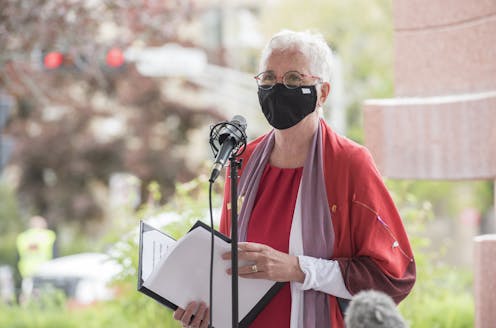
Earlier this month, New Brunswick’s Court of Queen’s Bench ruled that the province’s lieutenant governor must be bilingual. The ruling brought to an end an 18-month legal challenge launched by the Société de l'Acadie (SANB) over the appointment of the Honourable Brenda Murphy.
Because Murphy is not functionally bilingual, the SANB argued that the appointment violated official language rights, specifically sections 16, 16.1, 18 and 20 — all protected by the Charter of Rights and Freedoms. New Brunswick is the only bilingual province where English and French are official languages.
Though the court’s conclusion is laudable (and I agree with it completely), the process by which it reached that conclusion is deeply flawed. The federal government must appeal this ruling — not because it disagrees with it, but because such a consequential decision requires greater appreciation of the Crown and its constitutional nuances.
An illogical court ruling
We need to separate the ruling’s conclusion from the logic it took to arrive there because the logic is highly problematic and the ruling is constitutionally incoherent. It demonstrates a poor understanding of who or what the Crown is in Canada.
The ruling conveniently avoids using one part of the constitution (the Charter) to invalidate another (Section 58 of the Constitution Act 1867), raising questions about the case’s justiciability.
Legal scholar Kerri Froc describes it as an “unreasonable interpretation” of the Charter and a “massive overstep on the separation of powers.” Political scientist Stéphanie Chouinard notes that the ruling poses “new questions on law that have far-reaching consequences beyond language rights.”
The ruling’s logic is also odd because it focuses primarily on access to service delivery from the lieutenant governor through their legislative roles and interactions with the public. While important, they are not essential to the constitutional purpose of the lieutenant governor and can be remedied.
For example, if the lieutenant governor’s capacity to deliver a throne speech in both languages is a problem, New Brunswick could follow Québec’s lead and do away with having their lieutenant governor pronounce the government’s legislative agenda.
If the concern is the lieutenant governor’s ability to understand both language versions of a bill before granting Royal Assent, New Brunswick could adopt Ottawa’s approach and delegate these duties to representatives of the lieutenant governor.
The lieutenant governor’s ability to interact with members of the public in both languages is also not a constitutional requirement of the job. It is a vanity to justify the public expense of the position. The courts should know better than to conflate the two.

An extraordinary conclusion
The court’s conclusion is a fascinating one: that for the equality of New Brunswick’s settler linguistic communities to be realized, the position of lieutenant governor must be bilingual. Therefore, the position’s officeholder must also be — making New Brunswick’s lieutenant governor the only individual in provincial office bound by the province’s constitutional official language obligations.
In other words, New Brunswick’s Crown and thereby its lieutenant governor is distinct from others in Canada.
Despite not demonstrating a solid understanding of the Crown, the Court of Queen’s Bench arrived at a similar destination as my own research. The ruling asserts that there is not a single unified Crown in Canada represented differently across provinces. Rather, there are multiple Crowns in Canada with their own distinct features and unique obligations to place upon officeholders.
New Brunswick’s Crown, the court argues, is the only one in Canada with a constitutional responsibility to two linguistic communities that are equal partners in the development of their settler state. This is an extraordinary declaration from the court and a critical advancement for our federation.
Unfortunately, the novelty of the court’s ruling is undermined by its reliance on the status quo.
The constitution identifies New Brunswick’s settler nation as composed of two linguistic communities of equal status. The lieutenant governor, as the provincial head of state, is the political expression of this nation and therefore, according to the court, has to be bilingual.
Yet the court also affirms that the lieutenant governor’s position remains a fundamentally British institution, meaning minorities, including francophones in New Brunswick, must continue to navigate the flawed limits of representational politics.
Basically instead of assuming that francophones are equal partners, the court asks francophones to continue to be a minority, subservient to an English and Loyalist default to which the French language is an add-on. Although this court ruling is “wonderful news for the French language,” it is not wonderful news for New Brunswick’s broader French-speaking community because it does not affirm the equal status of francophones.

A made in New Brunswick solution
Where does this leave New Brunswick? In desperate need of leadership.
Federal ministers like Dominic LeBlanc and Ginette Petitpas-Taylor, who are francophone and from New Brunswick, may be in an awkward position. They cannot be seen supporting an appeal of a ruling celebrated by some members of New Brunswick’s francophone communities, but their government cannot let a court ruling stand that is so ridiculous and that confirms francophones are second-class citizens and not equal partners in relation to the provincial viceregal.
LeBlanc and Petitpas-Taylor must spearhead the government’s appeal of this ruling — greater judicial clarity grounded in a solid understanding of the Crown and its purpose are desperately needed.
And while we wait, there is much that the federal government can do to support New Brunswickers in determining for themselves — without the help of senators from Québec — who and how their head of state should embody their society.
Robert Tay-Burroughs's research is supported by the Social Sciences and Humanities Research Council and the Leonard and Kathleen O'Brien Humanitarian Trust through the O'Brien Foundation.
This article was originally published on The Conversation. Read the original article.







